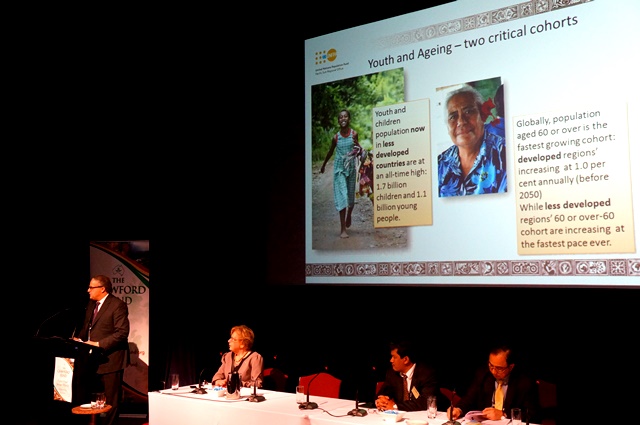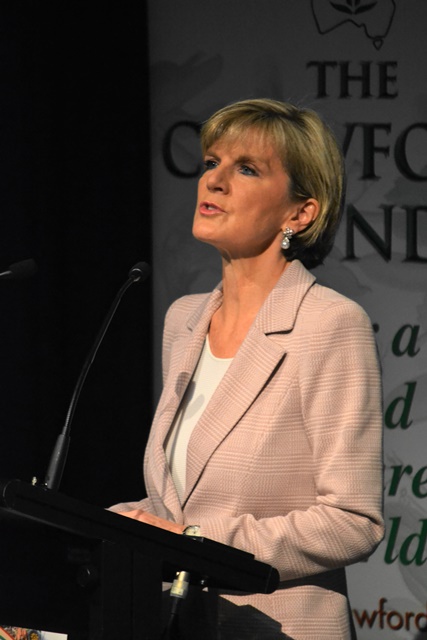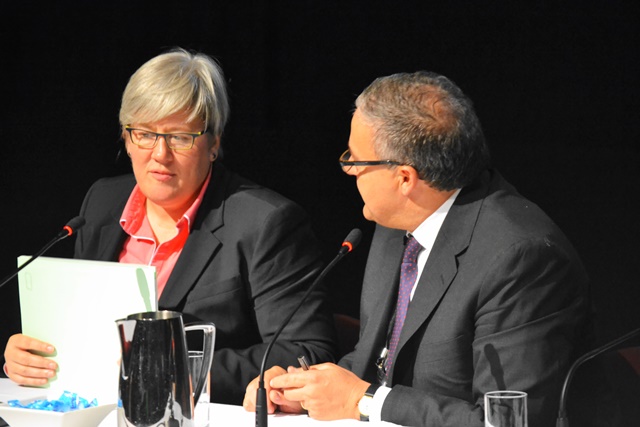By mid last year (2013), the world was home to an estimated 7.2 billion people; human beings will increase by a projected one billion in the next 12 years and one of the most pressing questions today is whether we will have enough food for everyone.
Some view genetically-modified food as a stepping stone into ensuring there is some form of food production, even if they are nurtured in laboratories, in a future where our nonchalant attitude to environment conservation today will deny us good agriculture-worthy soil.

When one considers how the situation of food security will be compounded by changing climate patterns, the enormity of our responsibility to ensure food security should be stopping is in our tracks.
This is essentially the question that a parliamentary conference in Canberra, Australia is attempting to collate narratives of, from the different perspectives of organizations and persons whose work are related to the agriculture sector.
This year, the Crawford Fund which has an annual parliamentary conference in Australia's Parliament House is considering the question of Ethics, Efficiency and Food Security: Feeding the 9 billion, well. The Crawford Fund's mission is to increase Australia's engagement in international agricultural research, development and education for the benefit of developing countries and Australia.
Can we really feed the global population presently projected to number 9.6 billion by 2050 or 10.9 billion by 2100, assuming the current fertility rates remain constant? If fertility rates were to increase even by half a baby for each woman, we can expect world populations to be already 10.9 billion by 2050 and a staggering 16.6 billion by 2100.
It is a valid question when one considers the environment destruction that continues through ill-planned and unsustainable approaches to efforts of improving people's lives. Food security is the state of having reliable access to a sufficient quantity of affordable, nutritious food.
The United Nations Population Fund was asked to answer the questions: Food Security and Population Growth: Are they Connected? and to discuss the topic of Population and Food Security: Key Trends and Changing Dynamics.

UNFPA Pacific Director and Representative Dr Laurent Zessler emphasised that presently, the world has enough food to feed everyone but that it was a question of access and/or distribution, which leads to the question of equity.
Dr Zessler emphasized that responses to food insecurity have to be considerate of the significant youth and ageing populations in developing countries, and women, reminding participants that action is and will continue to be most needed where food insecurity is at its highest levels: in countries with high fertility rates.
Dr Zessler spoke of population trends and dynamics that would be relevant to any analyses or responses, underlying the two critical cohorts of children and youth (presently at an all-time high of 1.7 billion children and 1.1 billion young people) and how the ageing populace of 60-year-olds and over are the fastest growing cohorts, increasing by a significant one per cent annually.
"Nothing short of an effective holistic approach will ensure a balance between population dynamics and food security," Dr Zessler said.
"Dignity in human rights and non-discrimination for all, universal access to sexual and reproductive health and rights and services, and strong global and national leadership are critical components to our regional and international response.
The link between food security and good sexual and reproductive health and (lived) rights should not puzzle so much: it is logical for example that if couples can effectively plan how many children to have and when to have them, according to the resources they have as a family unit in whatever form this may be, the couple would already be able to feed themselves and their children, well.
If there is indeed enough food and we just need to address the issue of access or distribution, a fundamental place to begin this process would be an honest consideration of our national status of social and gender equity status.
Any response to food insecurity has to centralize humanity; the relationship of population dynamics to development is so intertwined with issues of poverty, patterns of production and consumption, and inequality that none can be effectively addressed in isolation.
Securing real engagement from the private sector is critical particularly in terms of aid for trade: secure non-discriminatory economic policies which allow equal access to agricultural financing for example and a country is well on its way of developing socio-economic infrastructural prerequisites to be a serious trading partner.
Global studies have affirmed that if women were given equal opportunities in the agriculture sector, they would increase yield to up to 30 per cent which equates to feeding an extra 150 million more people. In all Pacific island countries including Papua New Guinea, women outlive men which may be a key demographic detail that has not been seriously considered, in relation to investing in women.
Investing is sexual reproductive health and rights of couples can end the global deprivation of up to 30 per cent of agricultural yield. It is about access and distribution: we must ensure women can access agro-financing opportunities or just being able to continue farming their husband's land after he dies would most certainly reap dividends for both her family and her community.
We can begin our response by changing the way we perceive population growth in relation to food security - it is not a threat but it is about management: populations are dynamic and there will always be movements within it but it is critical that we are smart in managing it when it comes to related issues like ensuring everyone has access food.
In 1994, one of the tents of the International Conference on Population and Development (ICPD) read: Increasing social, economic and political equality, including sexual and reproductive health and rights, is the basis for individual well-being, lower population growth and sustainable development.
In food security-speak, the UNFPA proposes that fundamental to addressing food insecurity is centralizing humanity in development plans and investing in real social and gender equity.
If individuals and/or couples can realize their rights to family planning today without fear or prejudice, it will influence population growth and food security dynamics tomorrow, for the better.


